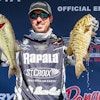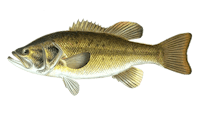How to Fish a Weed Edge with Bob Downey
Published: Updated:
All Featured Products

St. Croix Legend Tournament Bass Spinning Rods
$290.00 – $335.00
Jump to 0:42

VMC Neko Weight
$3.99
Jump to 1:25

VMC RedLine Series Wacky Neko Hook
$6.99
Jump to 1:30

VMC Crossover Ring 10pk
$4.49
Jump to 1:32

Zoom Magnum Finesse Worm
$5.99
Jump to 1:37

Humminbird MEGA Live Imaging
$1,099.99
$1,499.99Jump to 2:35

Humminbird Helix 12 CHIRP G4N - MEGA+ Imaging - EOL
$2,199.99 – $2,699.99
Jump to 2:46

St. Croix Legend Tournament Bass Spinning Rods
$290.00 – $335.00
Jump to 3:45

Zoom Magnum Finesse Worm
$5.99
Jump to 4:04

Humminbird MEGA 360 Imaging Transducer - Ultrex
$1,299.99
Jump to 6:07

Humminbird Helix 12 CHIRP G4N - MEGA+ Imaging - EOL
$2,199.99 – $2,699.99
Jump to 6:37
Video Transcript
Everyone, Bob Downey here. Today we're on a natural lake fishing a weed edge or a grass edge. And what I mean by that is on most of our natural lakes, you've got weeds that grow around the rim of the entire lake. And eventually, where the sun can't penetrate anymore to grow those weeds, there's going to be a clean edge to it. Or sometimes the edge has its little more sparse and there's clumps outside of it. Sometimes it's a clean edge, it kind of depends on where you're at.
But we're on the, what I would say the outside edge right now, which on this lake's in that 12 to 15 foot range. And the fish use that edge to feed those blue gills, like to sit near or on that edge. And the largemouth bass that we're targeting today are in turn also going to be on that edge. And they'll school up at times depending on how the structure lays out. And they'll be inside turns, points. Sometimes there's gravel or rock that'll butt right up against that edge. And that'll make those spots a little bit better.
But the way that I fish it, a couple different deals. Right now I'm fishing a Niko rig plastic worm. So it's got a nail weight in it. And then I've got a VMC red line hook and a VMC crossover band. And then we've got the weight up here in the head. And I'm casting it out and I'm letting it sink down into that grass. And then I'm slowly working it back. And you're imitating a blue gill kind of coming through that grass. And I'll throw that a lot. I'll throw a Texas rig plastic or a jig for the most part on these weed edges. Other things, jig worm, drop shot. You can even throw a weightless wacky worm if you've got calmer conditions.
Right now we've got a little bit of wind. So I want something with some weight that gets down there. But medium to long cast. Let it sink down onto that grass edge. And then just twitch it back. Let it fall into the grass, twitch it back. And right now I'm throwing probably 10 to 20 yards up into the grass edge and working it back off of the edge. It's just a really good summertime pattern here on our natural lakes.
You can see on mega live all the blue gill that are sitting out here. All those little dots up. Here's your grass, the white here, the bottom. And above it, those little specks are all blue gill. And the bass are harder to see when they're sitting in the grass. They're down in there and they'll feed on those blue gills throughout certain times of the day. Usually morning and evening is a good time. But there'll be certain windows throughout the middle time of the day as well where they'll feed. So that's what we're targeting.
And you're looking for irregularities along that edge. Whether it's an inside turn or a point or some rock that butts up to it. Or there's some time rocks sitting inside the grass too and that can be really good as well. So a couple different options to fish it. A couple different things to look for along that edge. Irregularities, bait fish. And really just get on your trolling motor and go until you start running into fish. If you catch one, stop. Make several other casts into that area because there's usually going to be more than one fish there. But kind of bit it like a pike would. That's it is a bass.
There you got a large mouth on the Nikko. It's right up on top of the grass actually. Decent little fish. You can see there's a little bit of the grass we're fishing. We're a little bit earlier in the year right now. Early summer. Decent little chunk. So that's, I don't even know, it's like a stringier type grass that we've got that's coming up a lot. I'll get this one back. Eventually they'll be what's called coontail. And that's a very desirable type of grass that large mouth like to get in mid summer. It's not quite up yet to this. You know, it usually comes up a couple of feet below the surface. It's down there. We're catching little sprigs of it every so often. But right now it's more your stringy stuff that comes up first that eventually it dies off mid summer than that coontail gets really thick. But that one was actually up on top of the grass as we were working it back. So our bait hadn't even got to the edge yet. And so, you know, different times of the day, those fish will position differently in the grass. Sometimes they're going to be off the edge, more on the open water, sitting, you know, maybe closer to the bottom. That one was up in the weeds more. Kind of where we've been seeing these bluegills hovering above the weeds. So they'll sit, you know, just down below where those weeds top out. And if a bluegill comes up over the top, they'll come up and grab them. And that's probably what happened right there. I was just kind of working over the top and he came up and grabbed it.
Another really key piece about fishing these grass edges or grass beds in the summertime is looking for bear spots within the grass. So imagine an entire football field full of four or five foot tall grass. And also you got like a 30 by 30 yard square of just nothingness, just bare bottom. Well, that's something different that those fish can relate to. And they love to school up in those areas and use them as ambush points. The bluegills will get in those holes in the bass. They'll sit on the edges and then they'll ambush them and feed on those bear spots.
Right now we've got one that's showing up pretty good on 360. You can see the grass here. The outer edge is this way. The inside is that way. And right up here we've got a nice bear spot, a clean spot. You can see the fluffiness of the grass here. And right here is a nice clean spot. We just got a couple smaller bass out of it. But those are the types of areas you're looking for on 360. If you don't have 360 you can find those areas with your traditional 2D sonar as well. You know right here is bottom. This is all grass. If we were to bump up to that area you would see just bare bottom and no grass. And then if you kept going you'd start to see grass again. And so that's really what we're looking for. Are those bear spots. It's pretty easy to see on 360. If you don't have 360 you can certainly still find it with your traditional 2D sonar as well. Just look for those areas that are void of grass. In an area where you know there's a big grass but if you come across a bear spot slow down be sure you're picking those areas apart. There's usually going to be fish around.

